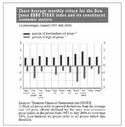|
|
Friday, 27th February 2026 |
| How do stock markets react to changes in oil prices? |
Back |
| With oil prices continuing to reach record highs, the ECB examines the impact this is expected to have on the stock markets. |
An increase in oil prices usually lowers the expected rate of economic growth and increases inflation expectations over shorter horizons. Decreasing economic growth prospects, in turn, lower companies’ earnings expectations, resulting in a dampening effect on stock prices. Moreover, the increase in input prices for companies associated with an increase in oil prices in general tends to compress profit margins. In addition, during periods of high oil prices, investors usually become more uncertain about the outlook for corporate earnings which, in turn, may lead to higher equity risk premia, putting additional downward pressure on stock prices. | | How do stock markets react to changes in oil prices? |
Normally, a combination of these factors tends to outweigh the positive effect on stock prices stemming from the decline in real long-term yields which often accompanies an increase in oil prices.
In the following, the influence of oil prices is examined by comparing the average stock returns for the broad-based Dow Jones EURO STOXX index and its sectors during periods in which oil prices were in a low/middle range or in a high range. The high range is defined as an upward deviation from the average real oil price in the period from 1987 to 2004 of more than 10 per cent. The chart displays the average monthly stock returns for the ten economic sectors of the index and for the total index under the different oil price regimes.
Several features emerge from the chart. First, aggregate stock prices in the euro area tend to be negatively related to the level of oil prices over the sample period, which starts in 1987. Overall, the Dow Jones EURO STOXX index increased on average by around 1 per cent per month during periods of low/medium levels of oil prices, but performed negatively during times of high oil prices. Second, the performance differed significantly across sectors. In general, energy and utilities seemed to be less affected by high oil price levels (compared with the overall index), whereas the cyclical goods, technology and telecoms sectors tended to underperform most in such circumstances.
Overall, the total market and sectoral stock price performances during periods of high and low real oil prices are consistent with the expectation that oil price increases influence stock prices negatively via their impact on the outlook for corporate earnings.
In this respect, the relative underperformance of the cyclical goods sector may be linked to investors' concerns that high oil prices may have a particularly strong dampening effect on the earnings within this sector as it is the most closely related to the business cycle.
However, some sectors may be less affected by or may even benefit from higher oil prices. Reflecting this latter possibility, the less negative return of the energy sector (ie compared with the overall index) may be explained by the fact that its revenues are positively linked to developments in oil prices. The utilities sector also performs relatively well when oil prices are relatively high, which may be linked to demand shifts towards alternative energy sources such as natural gas during those periods1.
1 It should be noted that other factors may also have had an impact on stock prices. For example, the negative performance of the technology sector during the periods of high oil prices may have been more related to the bursting of the stock market bubble between early 2000 and 2003. |
|
| Article appeared in the October 2004 issue.
|
|
|